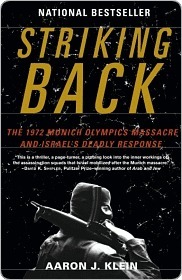More on this book
Kindle Notes & Highlights
Read between
March 18 - April 1, 2025
Black September’s leadership. They were determined to pull off an unprecedented, earthshaking attack—a theater of terror that would burn itself into the world’s collective consciousness for generations. They chose the Munich Olympics, to be held in August and September of 1972, as their grand stage.
“The testimony of athletes, delegation leaders, journalists and television crews makes clear that members of the delegation, other officials, and family members frequently talked among themselves about the obvious lack of security in the village, particularly regarding their housing.
At 0410 hours, two groups of four operatives each reached the village’s perimeter fence, near Gate 25A. They aroused no suspicion. Like many of the athletes returning from a night on the town, they wore Olympic sweat suits and were ostensibly sneaking back to their rooms. One of the two terrorist bands met a group of American athletes near the fence. The tipsy Americans and the wired Palestinians helped each other over the simple, six-foot barrier. Once inside the village the two groups walked together for a while before parting and bidding each other good night. The terrorists carried Olympic
...more
They encountered no guards as they made their way through the village, although six German postal workers had noticed the Palestinians as they jumped over the fence. To their sober eyes the men seemed suspicious. They reported the break-in, but no action was taken. Walking quickly, Issa led his men straight to 31 Connollystrasse. Arriving at the building, each one pulled an AK-47 out of his gym bag, snapped a thirty-bullet magazine into place, and slipped a round into the chamber.
Lalkin raced to the first-floor living room, to the only phone in all of the Israeli housing units. He knew part of his delegation had been seized and that at least one member was dead. He got an outside line and called the Sheraton Hotel, where all the Israeli journalists and Olympic officials were staying. “Call Israel!” he said. “Arab terrorists have taken part of our delegation hostage.”
Meanwhile, in the room where the hostages were being held, wrestler Yossef Romano, who had torn tendons in his knee and was using crutches, began to contemplate a desperate move. He had witnessed Weinberg’s attempt to seize a weapon, had seen him killed; nevertheless, he lunged at one of the terrorists, grabbing for his gun. He managed to put the terrorist flat on his back but was shot by another one of the hostage takers. Romano’s dead body was left in the center of the living room. Nine hostages remained.
In America, ABC held the exclusive television rights to the 1972 Munich Olympic Games. Their morning coverage began with sports reporter Jim McKay saying, “The Olympics of Serenity have become the one thing the Germans didn’t want it to be: the Olympics of Terror.”
The terrorists released two pages of tight typewriter script, containing the names of the 236 prisoners whose release they demanded, 234 of whom were held in Israeli jails. Among them were Kozo Okamoto, the Japanese terrorist who had attacked passengers at Lod Airport, and the two Palestinian women who had carried out the Sabena hijacking. The additional two prisoners, the notorious urban guerrillas Ulrike Meinhof and Andreas Baader of the left-wing Red Army Faction, were held in West German jails. The terrorists demanded that all the prisoners be released by 9:00 A.M. and transported to an
...more
Concurrently, Golda Meir spoke to a reporter in her office. Why wasn’t Israel willing to bargain with the terrorists? the reporter asked. “If we should give in,” she replied, “then no Israeli anywhere in the world will feel that his life is safe.” After a few beats of introspection, she added, “It’s blackmail of the worst kind.”
Jim McKay immediately broadcast the devastating update to the world. He looked straight into the camera and said: “I have just gotten the final word. When I was a kid my father used to say, ‘Our greatest hopes and our worst fears are seldom realized.’
Tonight, they have been realized…. They’ve now said that there were eleven hostages. Two were killed in their rooms yesterday morning. Nine were killed at the airport tonight…. They are all gone. It’s all over…. I have nothing else to say.”
“Some people say that police mistakes caused the death of the hostages,” Manfred Schreiber, the Munich police chief, said. “But it was the other way around. The hostages died because the terrorists made no mistakes.”
The Israeli government declared September 7 an official day of mourning. The nation was traumatized. Flags were lowered to half-mast; stores, restaurants, and government offices were closed. People clustered in the streets, reading the papers in groups, learning the anatomy of the tragedy.
Golda realized that Israel’s response had to be remorseless, had to unequivocally convey the message that, for those involved in terrorism against Israel or Israelis, death would, like the sword of Damocles, hang menacingly over every head.
Israel had assassinated its enemies before, but now assassination would become a major tool in counterterrorism.
Every Arab name has four components: his first name, his father’s name, his grandfather’s name, and his clan name.
Golda Meir, King Hussein, and U.S. president Richard Nixon refused to bargain with the terrorists. Nixon delivered a televised address, announcing that the United States would not bow to extortion. Thirty-six hours later, without any prior communication, the terrorists rounded up the two U.S. diplomats and their Belgian counterpart and executed them in the basement of the embassy.
The assassinations in Europe and the Middle East, along with the astonishingly successful raid in Beirut, a Mossad-IDF collaboration, were starting to reap dividends. The mood in the agency lifted.
Nine long months had passed since the Munich Massacre.


